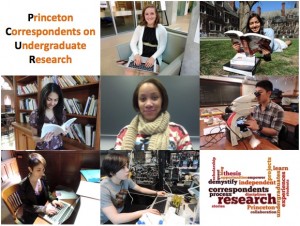I recently met a professor who said he finds Princeton especially interesting this time of year because, all of a sudden, people are constantly “constructing things” across campus. Teams of facilities workers string cables from buildings. They drive fences into the ground. They erect massive tents and lay dance floors and stages underneath.

Yes, Reunions and Graduation are a few short days away. Strangely, it seems that while students are winding down—finishing exams, heading off to summer programs or perhaps beach trips for “dead week”—the university undertakes elaborate, if temporary, projects in preparation for the pomp and circumstance of late May and early June.
With the start of summer, there will be a respite in our blogging work at PCUR. But before we “sign off,” it’s worth taking a glance back at correspondents’ contributions. This year, the blog’s first, our team of students has shared experiences and insights of both depth and breadth. They offered tips on making your way through the writing process and enumerated the dos and don’ts for drafting funding proposals or completing IRB applications. They interviewed students about senior thesis projects. They proposed creative strategies for choosing a major or getting started on a new project. We even got the chance to hear from a correspondent during her semester abroad about how to continue developing research skills at a new institution.
Some of my favorite posts include stories of challenges and successes in the labs or in the stacks. The Correspondents constantly remind us of the interpersonal, interactive parts of “independent” work— learning to ask for help, making a discovery after talking with a friend about a research problem, approaching your task from a different perspective.
Though the school year and blogging season is over, our undergraduates’ research is not! Many of our correspondents, alongside their fellow students, will continue research over the summer, whether in labs, internships, or summer study programs. We may not realize it at first, but the research skills that we learn at Princeton in our independent work or research-based courses have implications for summer opportunities that aren’t explicitly “research.”
The “research skills” I am talking about are the ones that we use when we discover a question or a problem and think critically about how to approach, and then solve, that problem. But isn’t that process one that we might encounter while working for an NGO, or tutoring students, or working with a startup, or even directing a play at a theater? The skills we hone will carry us through in other work. Even our graduating correspondents will be taking their research skills beyond Princeton: Yuem will continue research as a graduate student at Berkeley, Annie will research to best advise health care companies as a consultant in Boston, and I will do my best to impart some of the elements of good research—investigation, analysis, and writing—as a teacher to high school students in New York.
I’m excited to announce that Melissa Parnagian will take the lead on PCUR as Chief Correspondent, and the rest of our correspondents will continue in their posts. We also have a handful of new fantastic correspondents who will start in the fall! So stay tuned for more stories, more words of advice, and more live updates from the world of undergraduate research in the upcoming academic year. We look forward to continuing this research journey.
–Isabelle Laurenzi, Chief Correspondent

